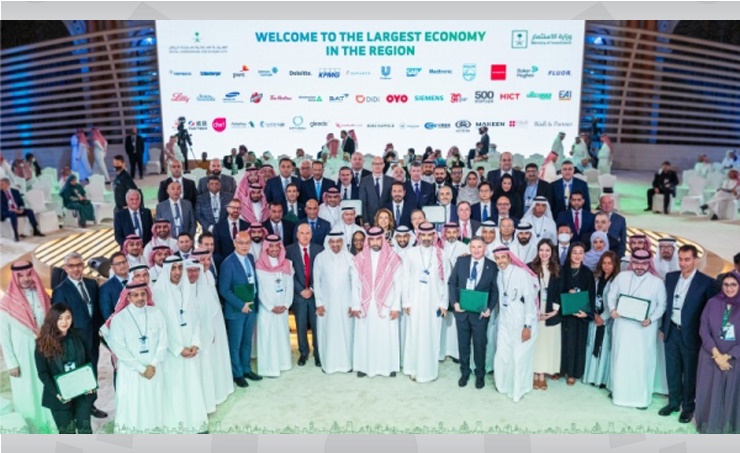Riyadh : A total of 44 multinational companies (MNCs) today received licenses to move their regional headquarters to Riyadh.
The licenses were issued at the fifth edition of the Future Investment Initiative, attended by the world’s most influential leaders in business and government. Among the companies are prestigious multinationals in diverse sectors including technology, F&B, consulting and construction.
An initial batch of companies signed MoUs at the last edition of FII in January, with more companies signing up in the following months, Saudi Press Agency (SPA) reported.
Through the Regional Headquarters Attraction Program of Multinational Companies, these companies now have direct access to the region’s largest economy, gaining financial and geographic opportunities whilst being part of one of the most exciting transformations happening in any city in the world.
The full scope of the program makes it attractive for multinational companies and their current and prospective employees, as well as their families, to relocate to Saudi Arabia.
Since the launch earlier this year, regional headquarters have been legally defined as a unit of a multinational group duly established under the laws of Saudi Arabia for the purpose of supporting, managing, and providing strategic direction to its branches, subsidiaries and affiliates operating in the MENA region.
“I am delighted by the number of multinational companies that have chosen to relocate to Riyadh, demonstrating that our national capital is becoming an increasingly attractive place to do business and developing into an investment destination of choice,” Minister of Investment Khalid Al Falih said.
“These companies have recognized the unique opportunities presented by Vision 2030 and are well positioned to reap the potential rewards. This comes two weeks after the launch of Saudi Arabia’s National Investment Strategy that will further unleash the opportunities on offer through a series of game-changing initiatives designed to improve the Kingdom’s business environment.
“We have noted a strong response from investors in recent years, which is driving increases in FDI. As investment grows, we expect to see these investors expand their presence in the local market.”
The Regional Headquarters Attraction Program of Multinational Companies not only affords opportunities to multinational companies, but also provides significant direct and indirect benefits for Saudi nationals, residents, and businesses.
“The RHQ companies will bring new expertise, research and development as well as innovation in a wide range of sectors, resulting in knowledge transfer in the medium to long term, and improvement in the local talent pool,” CEO of the Royal Commission for Riyadh City (RCRC) Fahd Al-Rasheed, said.
“By 2030, the program will contribute USD 18 billion to the local economy and create around 30,000 new jobs.”
It is estimated that for every job attracted through the program, 2.5 jobs are created indirectly in the base economy. The program will also provide promising Saudi talent with opportunities to work in the multinational companies, enabling access to emerging sectors and creating a new generation of global Saudi MNC leaders.
“As an attractive city for MNCs, their employees, and their families to relocate, Riyadh is at the center of the Regional Headquarters Attraction Program of Multinational Companies,” Al-Rasheed said.
“We are undergoing a rapid transformation, as we look to double the city’s population and increase its economic footprint threefold by 2030. Four mega projects in the city are in progress to considerably advance quality-of-life rankings globally.”
Combined with the mega projects including King Salman Park, Green Riyadh, Riyadh Art and Sports Boulevard, initiatives such as the King Abdulaziz Project for Riyadh Public Transport, Qiddiya and Diriyah are creating an attractive and vibrant city filled with entertainment and recreational opportunities.
Sustainability is woven into all parts of the Kingdom’s transformation, with investments in the Riyadh Sustainability Strategy amounting to $92 billion, and $40 billion of that sum offering green investment opportunities for the private sector.
Moreover, Riyadh is on a journey to provide best-in-class infrastructure and regulations for aviation to boost international connectivity and increase flights to key markets relevant for MNCs committed to establishing their RHQ in Riyadh. Overall, this rapid transformation and growth is expected to increase demand for services and create jobs in areas such as healthcare, education, and logistics, and accelerate the development of new sectors like biotechnology, benefiting local communities and businesses.
Education is one of the most important drivers in attracting talented individuals and their families from abroad. Therefore, multiple educational reforms have been approved by the Council of Ministers under the Regional Headquarters Attraction Program of Multinational Companies, enabling international schools to set up with their own personnel.
Two international schools, Kings College Riyadh and SEK International School Riyadh, began operations in September 2021 with over 200 students already enrolled under the International Schools Attraction Program, a collaboration between the Ministry of Investment, the Ministry of Education, and RCRC.
“The Ministry of Education continues its efforts, with the support of our wise leadership, to achieve the objectives of the Kingdom’s Vision 2030 in providing modern and distinguished curricula that contributes to the development of a world-class educational system,” Education Minister Dr. Hamad bin Mohammed Al Al-Sheikh said.
“The International Schools Attraction Program provides exceptional added value for the exchange of knowledge and expertise to our distinguished national talents in the education sector and specialized international cadres.
“These schools have sufficient flexibility to ensure a stimulating learning environment, achieve distinguished academic results, and provide a different and enhanced educational journey for students.”
In summary of this historic program, Fahd added they are determined to create an environment that unlocks business opportunities, broadens the economic base, and creates jobs for Saudis.
“That is exactly what this program achieves by easing entry into the Saudi market for MNCs to help them tap regional market opportunities in the largest economy in the region,” he said.


